IFANCA Joins UNICEF Delegation to Jordan as Part of Ongoing Partnership to Address Food and Health Insecurity
Amelia Keleher, Food & Health Equity Program Coordinator at IFANCA

In June 2021, IFANCA announced a US$3 million grant as part of a five-year partnership supporting UNICEF’s ongoing efforts to ensure equitable distribution of COVID-19 vaccines to 144 countries. Funds provided by IFANCA also support UNICEF’s work with the World Health Organization (WHO), health equity partners, and communities to address misinformation and build trust in vaccines and the health systems delivering them through the COVAX campaign.
A trusted third-party certifying body for over 40 years, IFANCA is dedicated to addressing food and health security on the local, national, and international level. As the world continues to battle with and recover from the COVID-19 pandemic, this grant will help bridge gaps in vaccination rates and access to education, employment, and nutrition.
“It is critical to address the concerns and needs of refugees and displaced populations, because lack of equity in nutrition and health has a significant impact on people’s daily lives. While the face of malnutrition is changing, its impacts continue to affect children worldwide,” says Austin Chu, assistant director, Global Cause Partnerships at UNICEF USA.
IFANCA’s visit to the Jerash and Za’atari camps offered more insight into the needs of residents living there and what philanthropy can do to mitigate the refugee crisis.
The photo story below offers a glimpse into the daily lives of those living at Jerash and Za’atari, the challenges they face, and the opportunities they seek.
Locally known as “Gaza Camp,” Jerash was established in 1968 as a result of the Arab-Israeli War. It is one of the oldest camps in the world and currently houses around 40,000 refugees.
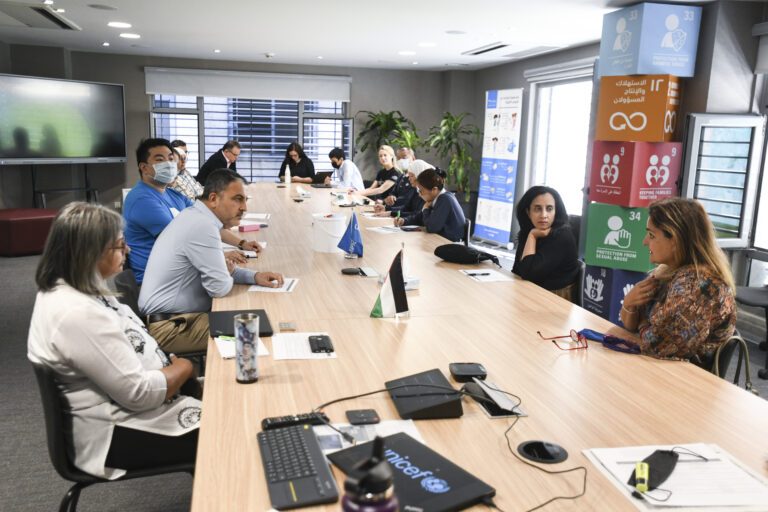
Prior to entering Jerash Camp, Asma Ahad, director of halal market development at IFANCA, and Saeed Hayek, PhD, quality manager and technical auditor at IFANCA – along with other members of the UNICEF delegation – were briefed about the history and services provided at the camp. This included an explanation of the camp’s efforts to address food and health insecurity. Here, Hayek and Ahad attend a briefing at the UNICEF headquarters in Amaan.
“When people are displaced, there are numerous needs that need to be met. While nothing can compensate for someone losing their loved ones, homes, communities, or security, philanthropy aims to bridge the consequences and mitigate the severity of the situation,” says Ahad.

This is what a typical street in Jerash looks like. Families in Jerash have lived here for three generations, and most of the population lives on just a few dollars a day.


As part of the visit, Ahad and Hayek visited the Makani Center, which translates from Arabic as “my house” or “my space,” and is a place where youth can gather to learn, socialize, and play. Members of the delegation spoke with the children about what they’re learning in school and what it means to be a refugee.
Addressing the refugee crisis goes beyond addressing the immediate housing, health, and food security needs of those who have been displaced by war and conflict; it is also critical to ensure that people have long-term access to employment, training, and development opportunities to support their overall wellbeing.


The Saru Center is a space that empowers women financially by countering the gender-based challenges they face in the camp. Having access to a space where they can embroider and sell their work empowers these women to provide for their family and improve their economic independence. The Saru Center is also one of the only spaces in the community where women can gather outside their homes.


Due to work permit restrictions, refugees have limited employment and economic opportunities in Jordan. However, the vocational center provides internet access and the opportunity for community members to develop skills that can lead to supplemental income. Residents who use the center shared that it has helped improve opportunities for employment in their communities.
Za’atari camp is in the north of Jordan and is the largest Syrian refugee camp in the world. It was established in 2012 due to the ongoing Syrian Civil War, which has displaced over 7 million Syrians worldwide. Za’atari is divided into 12 districts that form part of a semi-permanent city and is home to 80,000 people, half of whom are children.
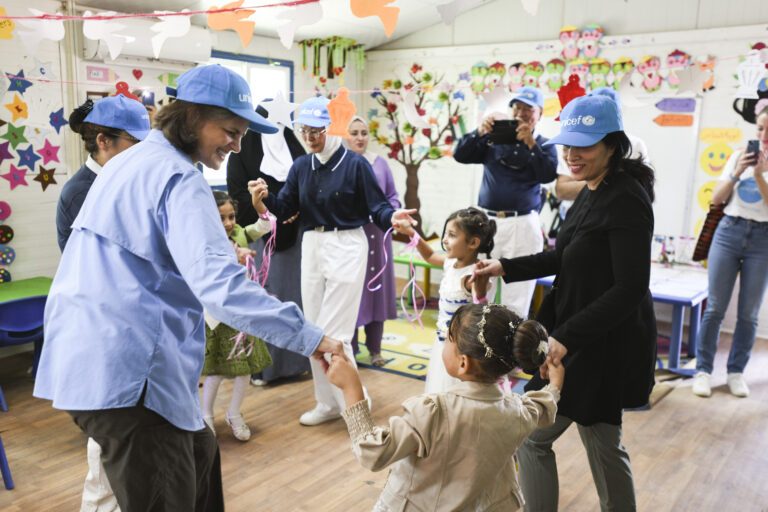
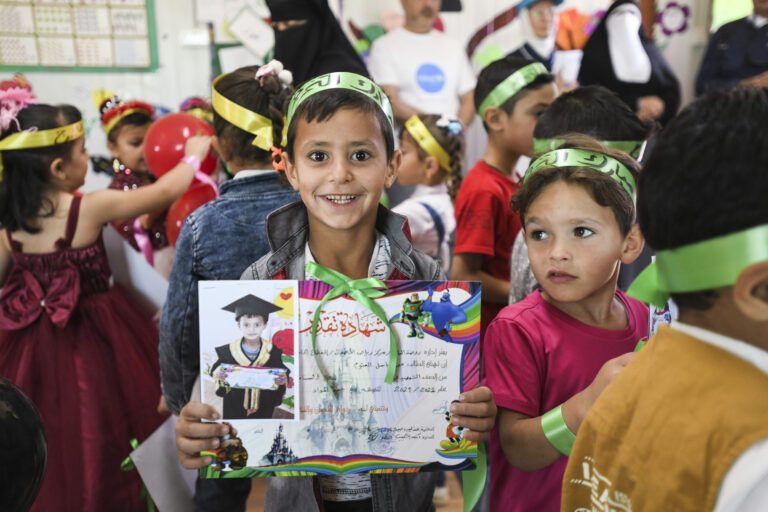
The UNICEF delegation visited several classes where students were celebrating their graduation from kindergarten. The students greeted the delegation with a lot of enthusiasm. Here, some students are shown proudly displaying their newly acquired diplomas and dancing and speaking with visitors.
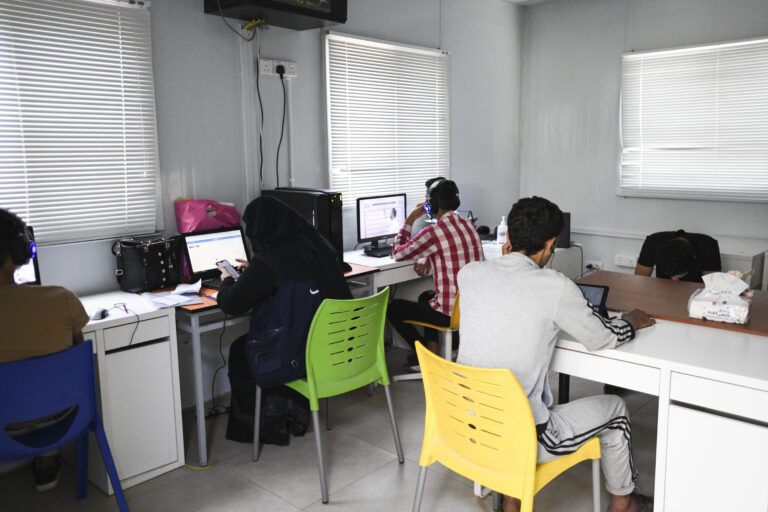
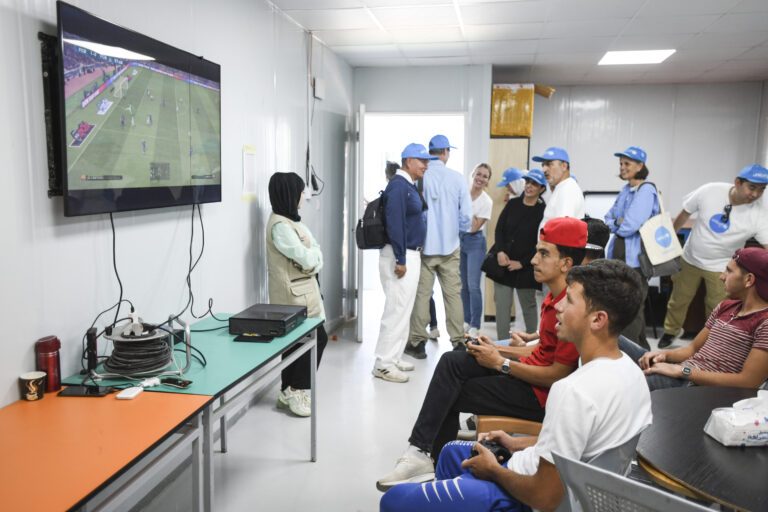
The delegation then went to Za’atari’s Makani Center, which is a space for youth to socialize, study, and learn hands-on life skills. The delegation spoke with several students who expressed a desire for more educational and economic opportunities.

Nusiba Mohammad Al Hariri, 15, has been taking a computer skills program at the center. “I wanted to learn computer [skills] because in school we only use books to learn,” she says in an interview with UNICEF. “I also like to learn computer skills because it will be important for my future. It can be useful for work, like in companies or as [a] receptionist, or in a restaurant.”
Al Hariri has lived at Za’atari for over ten years and wants to become a translator. She has started learning Korean and intends to learn French and English, too. She’s been coming to the center for four years and shared that the computer skills program is the most inspiring course she’s taken there. She hopes the center will add additional resources, such as Microsoft Office programs, to the course.
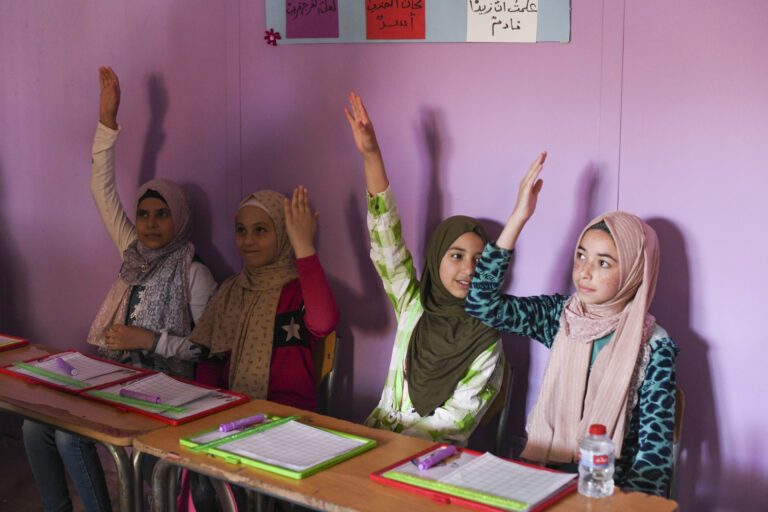
Bah’a Al Dein Hmoud, a book club facilitator at the center, explains in an interview with UNICEF why it is so important to incorporate interactive learning methods to engage students. “The old methods are usually writing on the blackboard and the student writes after the teacher. Now, there are new interactive methods for students to learn and benefit more from class, with the most amount of information,” he says.
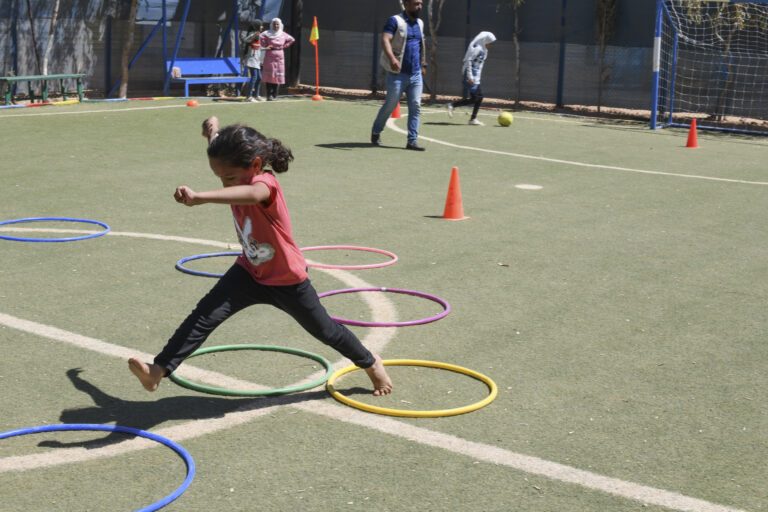
Al Dein Hmoud also says that it’s important to mix up the activities in each lesson so students don’t get bored. He believes that if students are educated in the right way, this helps build and elevate the community at large.
“We were in war and children have to be prepared psychologically and intellectually to build new ideas that the war has destroyed the last years,” Al Dein Hmoud says. He has made a point of asking his students what they want to be when they grow up to encourage them to dream, and he’s received responses ranging from “doctor” to “teacher” to “pilot.”
“My role as a facilitator is to help [them] accomplish these things. And in my opinion, this is how education should be. If students get the right learning skills, they will be able to achieve what they want.” And that, Al Dein Hmoud believes, “will help them build their future and the future of others.”


The Za’atari camp has a WASH (water and sanitation and hygiene) center to meet each family’s water needs. The camp has 20,000 families, and each family has their own unit that provides access to toilets, showers, and running water. Throughout the camp, there are murals, such as the one depicted here, that outline and encourage hygiene protocols.

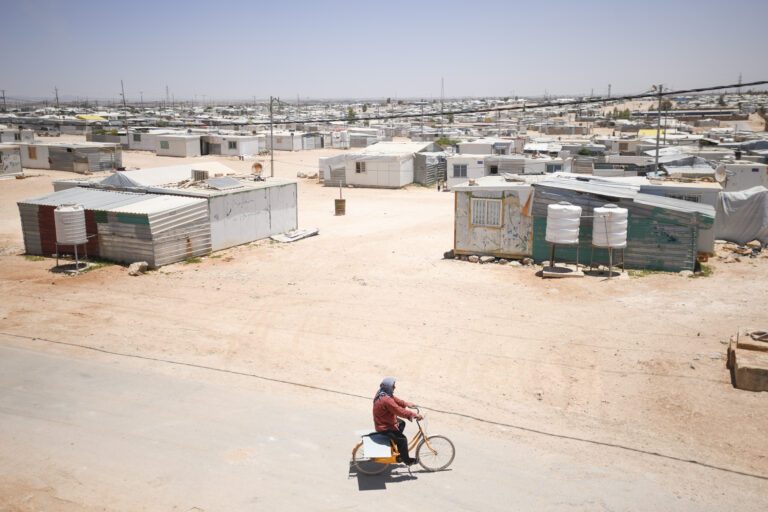
The delegation spent part of the afternoon walking around downtown Za’atari, which has been nicknamed “Champs Élysées” by the local community. Here, a young man sits outside a shop downtown, while a community elder gets around by bike. Like in Za’atari, most people get around Jerash by bike or mule as there are very few cars in the camp.

IFANCA also visited the United Nations High Commissioner for Refugees (UNHCR) headquarters in Amaan, Jordan. UNHCR’s U.S. Islamic Philanthropy program is supported by IFANCA, including its Ramadan campaign, Zakat fund, and the “Aiming Higher” educational initiative, which connects professionals with high potential refugee students as part of a mentorship and scholarship program.
Here, Hayek and Ahad pose in front of the UNHCR headquarters with Evie Prastakou, associate external relations officer at UNHCR, and Tayba Sharif, PhD, senior protection officer at UNHCR.
“Philanthropy alone cannot address the global refugee crisis, but funding and support from both organizations and individuals is necessary until people are no longer displaced,” says Ahad.
IFANCA is committed to strengthening global partnerships in order to meet the immediate and long term needs of people who have been displaced and are now living as refugees around the world.
If you are interested in learning more about the work of IFANCA, please visit www.ifanca.org or reach out to Asma Ahad at asma.ahad@ifanca.org.
Amelia Keleher is a food and health equity program coordinator at IFANCA. She works with organizations, community leaders, and colleges across the country to expand access to halal options for students. By cultivating strategic partnerships and developing written content, she also helps advocate for national halal legislation.